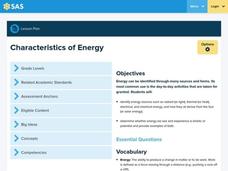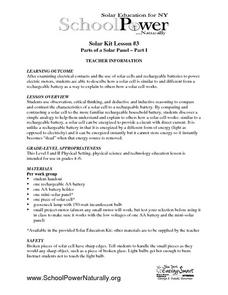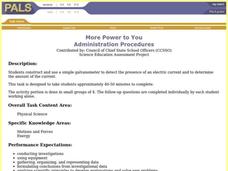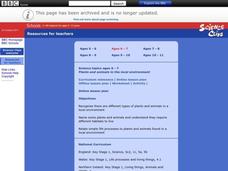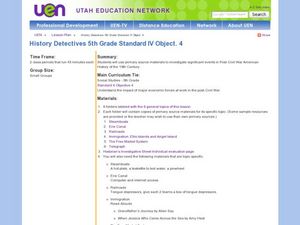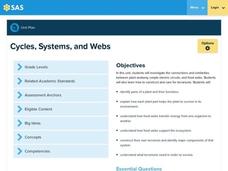Curated OER
Characteristics of Energy
Fourth graders view a video and create a KWL to identify energy sources. In this energy sources lesson, 4th graders explore the meaning of energy, kinetic energy, potential energy, thermal energy, radiant energy, and electrical energy....
Curated OER
Parts of a Solar Panel-Part I
Students examine electrical contacts, solar cells, and rechargeable batteries and compare and contrast the characteristics of a solar cell to a rechargeable battery in a hands-on activity. Students complete a worksheet as they...
Curated OER
Resistance
In this resistance worksheet, students use batteries, a breadboard, washers and more to make a parallel circuit and create resistance. Students then answer 7 questions.
Curated OER
Signaling
In this signaling worksheet, learners follow directions to make a circuit involving batteries, light bulbs, wires and more. Students then try to make morse code signals with their circuit.
National Nanotechnology Infrastructure Network
Wet Etching in Nanofabrication
Chemistry and physics combine forces to benefit nanofabrications. Learners examine the process of wet etching in nanofabrication. Using corrosive substances such as lemon juice and Coca-Cola, they model the etching process. They then...
Curated OER
More Power to You
Pupils construct a simple galvanometer in order to detect the presence of an electric current as well as determine the amount of the current. Activity is divided into two parts, first part as group work and second as individual.
Curated OER
Insulators And Conductors
High schoolers investigate the flow of electricity and how it effects different objects in the classroom as being classified as an insulator or conductor. They work in teams to test the conductivity of different classroom objects after...
Curated OER
The Technology of Light
Students study the different types of light bulbs. In this exploratory lesson students complete several activities and create an electrical circuit.
Curated OER
Plants and Animals in the Local Environment
Students recognize the different types of plants and animals living in a local environment. They determine how they require different habitats to live, and relate simple life processes to plants and animals found in local environments.
Curated OER
Making an Electromagnet
Young scholars explore electromagnetic forces. In this electromagnetic activity, students construct a working electromagnet and conduct a series of experiments to see what increases the strength of an electromagnet.
Curated OER
OHM's Law
Students study the relationship between current, voltage and resistance in a series circuit. For this investigative lesson students watch a demonstration and see how voltage is measured and see what OHM's law is.
Curated OER
Lightning Rod
For this lightning rod worksheet, students make a lightning rod out of batteries, breadboard, light bulbs, wires, and more. Students also answer 2 questions.
Curated OER
Homopolar Motor Experiments
Learners construct a homopolar motor following certain procedures. In this physics lesson, students explain how generators and motors work. They compare and contrast the characteristics of both.
Curated OER
Electromagnets
Students conduct a series of experiments on electromagnets. In this physics lesson, students build their own electromagnet and explain how it works. They determine the factors that affect its strength.
Curated OER
Post-Civil War American History
Fifth graders examine significant events in Post-Civil War America. In this Post-Civil War lesson, 5th graders investigate the important events after the war in 19th century America. They read primary source documents about six topics...
Curated OER
Map Your School
Learners participate in a project to map their school. They measure and graph various areas around the school. Learners find the longitude and latitude of the school and research the school's history, and highlight special important areas.
Curated OER
Orienting a Photovoltaic Cell
By mounting a light bulb on a stand and a PV cell on another, physics apprentices experiment with the angle of incidence. Their goal is to determine the optimum angle for collecting solar energy. The use of a scientific calculator is...
Texas State Energy Conservation Office
Investigation: Concept Mapping Fuels
After reading an article, "Fuels for Everything," collaborative groups create a concept map poster of the transportation and non-transportation fuels. This makes a strong introduction to the different types of fuels used for transportion...
Curated OER
Hot Friction
Sixth graders use small electronic devices known as thermistors to measure the temperature beneath an object such as a coffee cup as it slides across a surface. By choosing different surfaces, 6th graders can compare in a quantitative...
Curated OER
Electromagnetism
Young scholars explore the generation of magnetic fields from currents in wires and measure the magnetic field directions. They measure magnetic fields in their own environment. They also examine how moving magnetic fields can create...
Curated OER
Building a Terrarium System
Learners create their own terrariums. In this ecological model lesson, students create terrariums using soil, seeds, pebbles, and two liter bottles. Learners compare the elements of a terrarium to a food web.
Pennsylvania Department of Education
Cycles, Systems, and Webs
Fourth graders review the parts of the plant and their functions. In this plant lesson plan, 4th graders recognize that plants must transfer energy to make food. Students understand the interdependence of organisms in an ecosystem.
Curated OER
What on Earth is That and How Can I Get One?
Students examine how we use submersibles. In this technology based lesson, students examine various technologies used by submersibles in ocean exploration.


